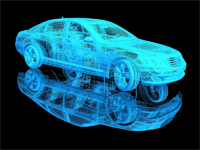
Predictive Analytics Enabling Optimization on the Lot
Stocking inventory on a car lot has largely been a process of guesswork based on everything from gut feel, to data on the previous month’s sales. This process may start to see a significant shift as algorithms start finding their way to the hands of the dealerships, says one automotive data vendor.
 Meet Dataium, an automotive data aggregator that claims to be the largest compiler of online automotive shopping behavior. The company says that they collect information from over 10,000 automotive websites and between 20-30 million automotive shoppers each month, and then crunches the data in order to provide predictive insights to their clients.
Meet Dataium, an automotive data aggregator that claims to be the largest compiler of online automotive shopping behavior. The company says that they collect information from over 10,000 automotive websites and between 20-30 million automotive shoppers each month, and then crunches the data in order to provide predictive insights to their clients.
“We have developed an algorithm we call Auto Shopper Intensity,” says president can co-founder, Jason Ezell. With the program, Ezell says that they can predict within single digit basis points which cars will have an increase and decrease in sales over the next 45 days. “When we look at sold data 45 days later, we are accurate to within single digit basis points of what we thought would happen.”
This is revolutionary for the auto industry, he says, claiming that with the data manufacturers can understand if they’re building the right cars in the first place, whether they’re painting it the right color, if they are distributing it to the right part of the country, etc. For dealers, Ezell says that this data is helping to decrease the time of “day turn,” the number of days a car sits in inventory, before it is sold.
“This leads to a lower floor plan cost, which leads to a higher bottom line,” says Ezell. “Having the right car in the right place at the right time to meet consumer demand on a market by market basis will change our industry for the better in ways that we have never had the luxury of in the past.”
Using the tool, Dataium claims that they’ve helped everything from top 5 OEMs to individual dealerships do everything from optimizing website sales, reducing incentive costs, predict trim and accessory demand levels by model and region, as well as uncover leads. All of it, says Ezell, leads to one thing: “a higher bottom line.”
Using its tool, the company has published a Super Bowl Promotional Impact Report, which details the impact of the automotive commercials aired during the Super Bowl. Their data shows that the Lincoln MKZ ad had the greatest influence on active in-market auto shoppers. They’ve also produced their own awards, based on analysis of 200 million shopping sessions in 2012, with 21 different award categories.
Headquartered in Nashville, TN, the company is approaching its four year anniversary, and says they are growing with several new hires this month, and a planned expansion into Australia.
Related Items:
How Ford is Putting Hadoop Pedal to the Metal
Big Data & Virtual Prototyping Changing Auto Design Culture
On Algorithm Wars and Predictive Apps






























